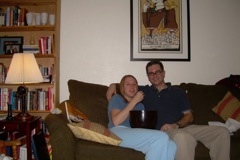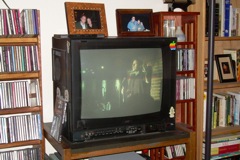Learning Adventure #9
Gary Stager asked us to watch "Comedian", the 2002 film about Jerry Seinfeld's return to stand-up comedy. Professor Stager had mentioned in a Tapped In session that he felt the film was the best example of a community of practice and of situated learning theories ever captured. With this in mind Meg and I popped some popcorn and sat down to watch the film.
There were a couple of ideas that emerged from Meg's and my viewing that I will discuss. Meg and I hashed out these ideas after watching the film.
Community of Practice
One of the most striking things about the film was the group of comedians with whom Seinfeld met and worked with to continuously and continually refine his routine. Colin Quinn, Chris Rock, and others appear to be frequent contributors to the dialogue that Seinfeld and the others create as they work to make their routines more funny. It appears that much of the work that a comedian does to improve her or his routine is not done in isolation. Rather, the work is continually refined before an audience, be it a couple of colleagues who are also comedians or a drunk, confrontational paying audience that demands funny. The refinement oftentimes occurs in the context of narrating an experience, which in turn helps to form new routines. This is perhaps where the young comedian, Orny Adams, faces the largest hurdle. Adams does not yet belong to a community of practice with whom he can commiserate, trade material, and work with as a critical partner in refining his work. Adams' seems to believe, in part, that the development of his material occurs in isolation. He has a difficult time accepting when the audience does not find a particular piece funny, but he does not recognize the importance of refining the work over time and before audiences of peers and drunks.
Comedy is not Static
What is funny changes as time progresses. In one of the most telling scenes, at the very end of the closing credits, Colin Quinn discusses how he continues to love a corny old joke that has been around, as Seinfeld explains, since the 1950s. Seinfeld proclaims the joke to no longer be fresh or funny, and Quinn's expression is one of reluctant acceptance of the fact. For a comedian to be good she or he must be constantly refining her or his body of work, as discussed before in the community of practice observations. Chris Rock spoke in awe of Bill Cobs' ability to perform a two and a half hour routine of which Rock and other assembled comedians watching the performance knew only one joke. Cosby was not content to rest on his laurels and let time-tested material carry him through a show. Instead, his work is continually updated and expanded to keep current with what is considered funny.
The Learning is Never Over
For Seinfeld, who compounded the experience by abandoning all his material and writing new routines, as well as the other comedians the process of developing their work and refining their work as comedians is never over. To build upon my experience researching Lev Vygotsky, I suggest that Seinfeld and the other comedians create a zone of proximal development in which they refine and develop their work. The zone of proximal development is defined as "the distance between the actual development level as determined by independent problem solving and the level of potential development as determined through problem solving under adult guidance or in collaboration with more capable peers" (Vygotsky, 1978). This ties both the community of practice idea and the need for refinement among a community of peers together as well. The comedians are engaged in a form of play; after all, their whole point is to make themselves, their friends, and a paying audience laugh. The comedians, working together between sets or shows to improve each others acts, are scaffolding one another and allowing the work to grow and develop.
"Comedian" was a great insight into the comedian's lifestyle, anxieties, and process. I have a friend who has worked hard in the past to make it as a stand-up comedian. It is difficult work, and I found the movie to be interesting because I had this connection to the industry and process. Seinfeld emerged as a person similar and very different to the persona he created in his eponymous television program and it was good to see him moving into this next phase of his life with the confidence that his past successes afforded him and the hesitation that any new project entails.
References:
Vygotsky, L.S. (1978). Mind in society: the development of higher psychological processes. Cambridge, MA: Harvard University Press.


